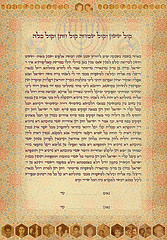
- Image by BijanTwisty via Flickr
This is Part IX of my series on Marriage in the Religious Zionist community in Israel.
Part I: Dating Readiness, Part II: Meeting the One, Part III: Genetic Testing, Part IV: Dating Venues, Part V: Shidduch Crisis?, VI: Internet Dating, VII: Paying the Shadchan, or Not, VIII: Wedding Costs.
Mazal Tov to reader and commenter Keren on the engagement of her daughter. Keren asked for wedding planning help on another email list. I received permission to publish this response:
Lizy_B writes:
We married in the north (Ulamei HaNesicha) a wonderful wedding. I don’t know about places in the center but there are a few principles we tried to remember:
- The options are endless. If you add more stuff (flying doves, etc.) to your wedding that costs a lot and impress certain people, it doesn’t change what they are: stuff that clutters your moment.
- The food should be very good. Never compromise on that one. Don’t forget food for vegetarians, and cheaper portion for children.
- A very cautious estimation: about 20% of your basic list (especially when it comes to people from work, and people you invite out of politeness) won’t come. Out of the people you’re sure will come and tell you they will, up to 10% won’t come and not know till the last moment (sick child, someone giving birth etc.).
- Save all the lists of people’s phone numbers and addresses you make for later use (a happy Brit ASAP…)
- Send invitations for people from abroad in advance.
- The groom should have two white shirts if one gets dirty/sweaty.
- If the bride wears stockings I recommend yarchonim (thigh-highs). I never wore those before my wedding and it seemed weird at first, but otherwise using the toilet becomes a nearly impossible task.
Number 4 really helps – we married 3.2 years ago. we have a 2.2 years old DS and I’m on the 38th week for the second. The family is betting on the second son being born on the night of the seder—so it helped us.
I especially agree with giving the caterer a lower number than you have confirmed. And anyone who says they are not sure, count them as a definite no. Assign someone to handle last minute seating problems. (Decent) caterers are always set up for extras.
Please share more tips in the comments. I’d love guest posts on choosing caterers and sorting through options, finding a wedding dress, and other aspects of wedding planning.
We have made a couple of simchas, so here’s our piece of advice. Do give the caterer a lower estimate of participants but discuss him reserving additional seats in case of necessity (in Hebrew this is called…rezerva). You only pay for these people if they actually show up. AFAIR, 10% of your estimate is a fair “rezerva” to ask.
Leah: Great tip about the “rezerva”.
While its true that a good number of people who tell they are coming won’t odds are that some people who said they were not coming, or who never answered in the first place, will show up (especially family). The more family you have, the more of an issue this is likely to be. Also, in recent years, many caterers have cut down on the amount of extra portions they have in reserve, to avoid waste and preparing portions that they don’t get paid for. We just married off a child, and with all of our contingency planning, we wound up with exactly one extra portion at the end. Had we failed to take into account the people who showed up without a response card, we would not have had enough food.
One thing that you may find useful to save money: If you are providing appetizer and / or soup as well as the main course, it may pay ask for some differs that are just the main course, for people who show up on the late side. They wind up not eating the soup and appetizer anyway, and caterers will generally give you a lower price.
Observer: Thanks for those tips. You’re right about people showing up late.
Maybe its just us, but we find that for many/most weddings, we leave before the main course gets served – we simply can’t be out so late! We come for chuppah, which then tends to be upwards of 1 hour or more late, and by the time soup or appetizer is done, its 23:00 are we are on our way home….
shoshana
I went to a chassidish wedding in Bnei Brak on the bus. I met another charedi woman I know, who was surprised I was getting there so early (around 6 PM). I arrived about 20 minutes before the chuppah–so I wasn’t that early at all. But many don’t show up till 9 or 10. I didn’t stay long.
Thanks very much for the mazal tov, and thanks for the tips
I would be happy to hear.
Shoshana, we are going to make the huppa before sunset and hopefully server the main course at a reasonable time.
The part I am thinking about now is what I should be buying for my DD?
People asked me “what about her Nedunya!”
Sheets, towels etc, what and where?
Slowly it is coming together